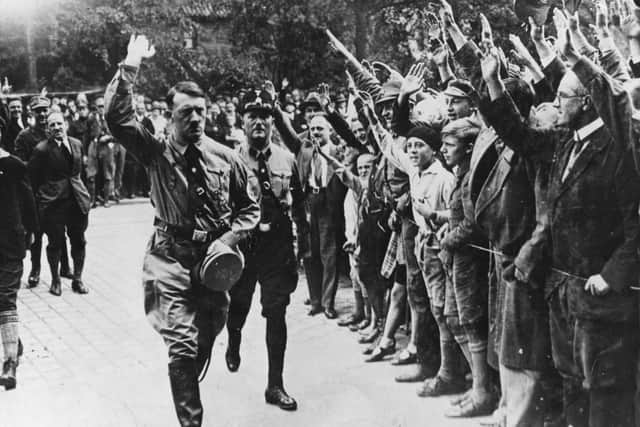Hitler promises ‘greatest election propaganda tour’ as he fights for the German presidency (1932)
and live on Freeview channel 276
By fast aeroplanes and high-power cars, he was promising to “make the greatest election propaganda tour the world has ever seen” in the next six days, addressing four or five meetings every day.
The first round of the battle on March 13, 1932, though it resulted in a clear victory for President Hindenburg over Hitler, was not decisive enough, as the veteran statesman failed by 150,000 votes to obtain an absolute majority over his opponent as required by the German constitution.
Advertisement
Hide AdAdvertisement
Hide AdThe News Letter noted: “Next Sunday the situation will be different, for only a relative majority is necessary to secure the re-election of Hindenburg. He has this time only two opponents, Hitler and Herr Thaelmann, the Communist, the other two candidates, ex-Colonel Dusterberg and the free candidates, Winter, having dropped out.”


The former Crown Prince had caused astonishment by issuing a manifesto urging electors to vote for the Nazi leader. In it the Crown Prince said: “Abstention from voting in the second poll of the presidential election is incompatible with the idea of Harzburg (Nationalist) front. Believing that a close Nationalist front is absolutely necessary, I shall vote for Hitler.”
The reference to the Harzburg front was an allusion to a big joint Nazi and Nationalist demonstration held there, at which joint opposition to the present regime was agreed to.
The News Letter added: “Surprise is felt, because Hitler himself and also Herr Hugenberg, the leader of the Nationalists, have dropped the idea of the Harzburg front.”
Advertisement
Hide AdAdvertisement
Hide AdHitler had left Munich for Dresden on the morning of Sunday, April 3, 1932, by aeroplane on his tour. In one week he was to speak in every big city in Germany to more than a million people. Scenes of the wildest enthusiasm were witnessed at Dresden and Leipzig, where Hitler addressed monster meetings. The News Letter also reported that there had been clashes between Communists and Nazis in Berlin, Hamburg, Chemnitz, and other cities on Sunday, April 3, 1932. During the day in Berlin over 40 Nazis and Communists had been arrested, while seven persons, including one policeman, had been wounded.
Comment Guidelines
National World encourages reader discussion on our stories. User feedback, insights and back-and-forth exchanges add a rich layer of context to reporting. Please review our Community Guidelines before commenting.